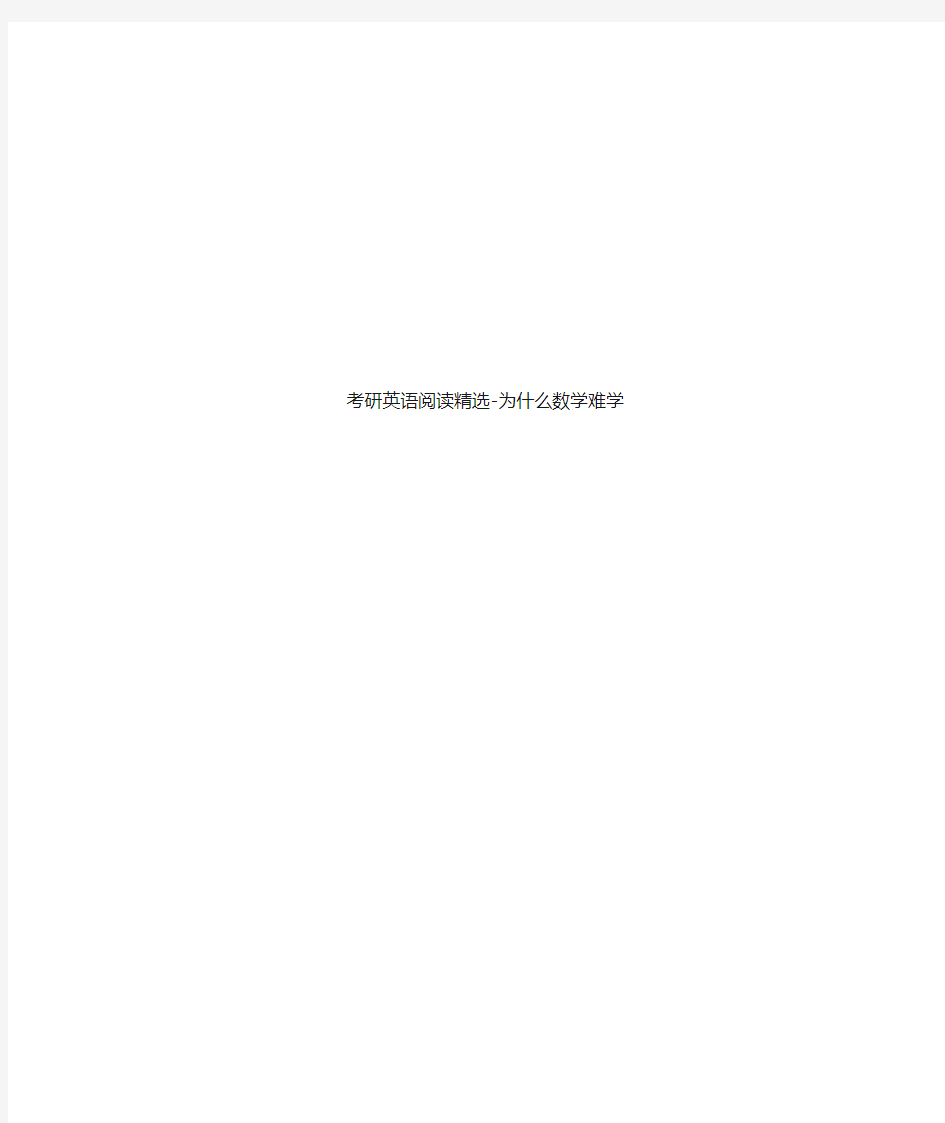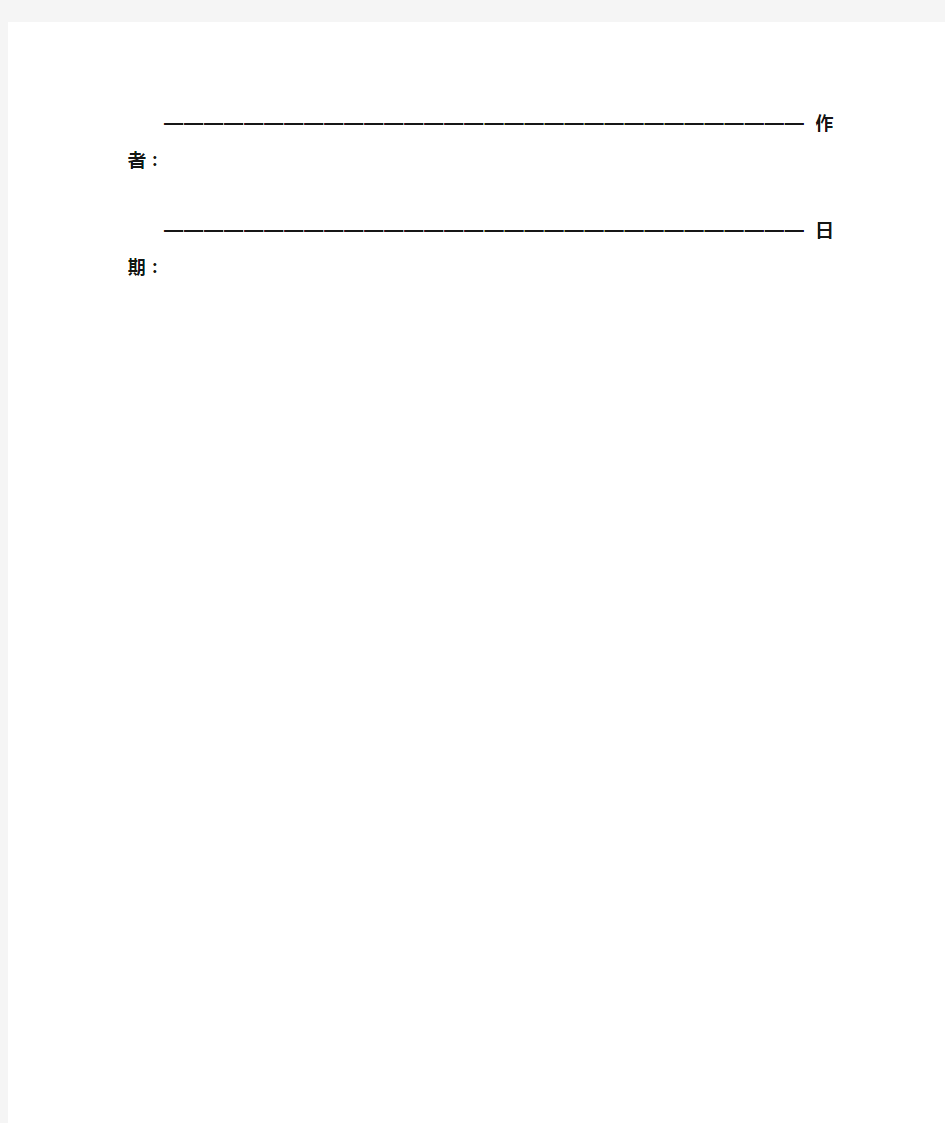考研英语阅读精选为什么数学难学


考研英语阅读精选-为什么数学难学
————————————————————————————————作者:————————————————————————————————日期:
2017考研英语阅读精选为什么数学难学?
考研英语阅读真题中的文章,多摘自英美主流外刊,有时候你认识所有单词、搞清全部语法还不够,还需要了解英美文化,掌握他们的表达方式,这就是阅读的潜台词。有时候是一些俗语和俚语,有时候是固定搭配,有时候需要借助历史、风俗、文化才能理解某种现象或表达。总之,这些地道的英语文章背后都有潜台词,一般人不容易读出,但往往是理解文章的关键。
WhyIs It So Hard toLearn Math?
为什么数学就这么难学?
导读:学语言真的很难。老实讲,它比学数学要复杂得多,也困难得多。不过,几乎所有的小孩子都能够学习并且熟练掌握一门语言。
Language ishard. In fact, it’s infinitely hardera nd more complicatedthanmath. And yet,nearly every smallchild canlearn andmaster language.
学语言真的很难。老实讲,它比学数学要复杂得多,也困难得多。不过,几乎所有的小孩子都能够学习并且熟练掌握一门语言。
Why is math so overwhelmingfor so many students?And how high isthe price wepay from havingsomany math-terrified or even math-illiteratepeople in oursociety?Too high, especiallyas the ability to
grasp dataandpursue advanced workthat involves mathis becomingincreasingly important forboth citizens and job applicants.
那到底为什么数学会成为许多学生难以逾越的鸿沟呢?因为社会上这些“数学恐惧症患者”,甚至是“数学盲”的存在,我们又得付出多大的代价呢?不用说,这代价简直太大了,尤其是在当今社会,获取数据和从事高难度工作越来越成为普通人和求职者的必备能力。
It often startswiththe problem of teaching ma th inthe abstract. Thismisses theremarkableamoun tofmathematical knowledge that wehumans alreadypossess. We knowhow tosolve forunknowns,for example. That’s algebra. We also are able to think in termsof three dimensionalspaces—that’s geometry and trigonometry. Sothismathematical language istheanalytical expressionof the way we already think.
问题一开始出在数学的抽象教学上。这就让我们错失大量数学知识,而这些知识是我们本身就具有的。我们知道如何去解决未知的东西,那么这就是代数。我们也知道用三维空间去思考——这就是几何学和三角学。这门数学语言其实就是我们思维方式的解析式。
But how manyofusfeelincapable,rather than poorly taught, when we areconfrontedwiththe rigo
rs ofmath?Howmany children who struggled to grasp mathconcepts, who lackedthenecessary tool kit, we reledto feel stupid, even demeaned?
然而碰到数学难题的时候,我们当中有多少人只会觉得是自己无能,而不会归因于教育问题?又有多少孩子绞尽脑汁地去记忆数学概念,却因为缺少必要的学习工具,而觉得自己愚蠢之极,甚至变得妄自菲薄?
Compare it tospoken or written language. When you make a mistake, a teacher correctsthe part that iswrong. And then youproceed. With math, if youdo n’thave the correct result, it is typicallytreated as wrong. And, as mistake aftermistake builds up, too many students simplygiveup: I can’t do math.
相比起来书面语或者口语,如果你犯了错误,老师就会对此进行更正,然后你可以再继续。而数学就不一样了,数学是如果你得不到正确答案,老师就会认定你做错了。随着错误不断堆积,很多学生干脆破罐破摔,直接放弃了:我就是搞不懂数学。
Butmath isnot about intelligence. It’s a language thattoomany peoplenever learn,oftenbecause the education process misses the number of ways that a given person can arriveat a given solution.
不过数学无关智力,而是一种许多人都未曾学习过的语言。很多时候就是因为教育过程不注重因材施教的方法,才会让数学变得那么“难”。That’s not afailure of children to learn.That’sa fa ilure of teaching. It’s a failure ofthe school. We should not blamethestudent. (These are children, after all.)
这不是孩子学习的失败,而是教育的失败,学校的失败。我们不该责怪学生。(毕竟他们只是孩子而已)
Partof the challenge is to identifythe gapsinknowledge, to clarify thatthe challengeis not that astudent simply doesn’t understand algebra or trigo nometry or whatever. There may be aparticular basicconcept that stands inthe way ofgoing forward in math, as well as other fields such as social sci ence or engineering.
我们遇到的挑战一部分是认清知识之间的缺口,以及明白这份挑战不只是因为学生不懂代数或者三角学。有时候我们可能会遇到某一个基本概念,它不止阻碍我们步入数学的大门,也会影响我们通往其他领域的步伐,比如社会科学或者工程学。
Overcoming this blockrequiresmoving beyond broad industrialized education andtoindividuali zed,personalized learning that allowsstudentsto find theirown way in.Showmeathousand studen tsand I’ll showyou athousand different pathways that they might take to achievemath success.
要克服这一困难,我们就必须得摒弃产业化教育,因材施教,这样有助于学生找到自己的学习方法。给我1000个学生,我就能让你看到拿下数学的1000种不同方法。
Withnew digital technologies and a massiveamountofdata collectionand analytics, we have the abilityto help students identifythe essentialconcepts they don’t understand. We have data on all th estudents that solved a particularmath problem and those thatfailedto solve it. We alsohave data onthe problems they were able to solve prio rto that.
有了新的数字科技、大量的数据收集和分析学,我们有能力帮学生记住一些他们原本并不理解的基本概念。我们收集的数据包括:对于某个特定的数学问题,能够解决和不能解决的学生情况,以及在那之前他们能够解决的问题。
So asa student recognizesthat they are struggli ng with, say, negative number concepts, they cangoback and masterthematerial—to fill in the gaps that allowsthem to go forward. And when they hitanother tough spot? They can jumpto the problemsthat allow them to master that concept. Thehopeis thatas they progress,their interest andenthusiasm increases.
因此,当学生知道他们正在与,比如说负数概念艰难地做斗争,可以回过头去,掌握一些必须的材料,将知识的缺口填补完整,这样就能继续往前走。那以后又碰到难题该怎么办?他们可以直接去解决一些特定问题,从中快速掌握该概念。我们希望,学生在进步的过程中,自己的兴趣和热情也能一起被提高。
Weare pursuingthis approach at theuniversity level. We also are seekingto incorporate this app roach at the high school, middle school and elementarylevels.This will make it possiblefor a growing number of students topursue degrees andcareersthat they neverthought.
我们现在正在大学教育中推行这一方法,也力求将其与小学、初中和高中教学结合起来。这样一来,越来越多的学生便有希望获得以前从未想过的学位或者职业。
In theyears ahead, that mindset, borne out of the failure ofmath instruction,should diminish. If we can succeed at breakingdown theassumptionthat there’ssomething wrongwith a 3rdgrader who cannotlearn math—rather thansomething wrong with the teaching process—then we can look forward to new generations of math-literatecitizens.Whatever career they choose, they will bemore confident and morecapableto understand andcontribute to an increasingly complex, data-driven world.
以后的若干年,由于数学教育的失败而生出的自卑心态应该逐渐消失。现在人们的想法是,如果一个三年级的学生学不会数学,那就是他有问题,跟教育过程完全没关系,如果我们能够成功打破人们这种想法,就可以寄希望于新一代的“数学盲”。不管他们选择什么职业,都一定会更加自信,且有更强的能力去理解这个日益复杂,数据驱动的世界,并为之贡献出自己的一份力量。
